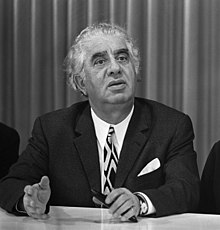
Back آرام خاتشاتوريان Arabic ارام خاتشاتوريان ARZ Aram Xaçaturyan Azerbaijani Хачатурян Арам Ильич Bashkir Арам Ільіч Хачатуран Byelorussian Арам Хачатурян Bulgarian Aram Hačaturjan BS Aram Khatxaturian Catalan Хачатурян, Арам Ильич CE ئارام خاچەتووریان CKB
Aram Khachaturian | |
|---|---|
| |
 Khachaturian in 1971 | |
| Born | Aram Ilyich Khachaturian 6 June [O.S. 24 May] 1903 |
| Died | 1 May 1978 (aged 74) Moscow, Russian SFSR, Soviet Union |
| Burial place | Komitas Pantheon, Yerevan, Armenia |
| Nationality | Armenian |
| Alma mater | |
| Years active | 1926–1978 |
| Era | 20th-century classical music |
| Political party | CPSU (from 1943) |
| Spouse | |
| Children | 2 |
| Awards | |
| Signature | |
Aram Ilyich Khachaturian (/ˈærəm ˌkɑːtʃəˈtʊəriən/;[1] Russian: Арам Ильич Хачатурян, IPA: [ɐˈram ɨˈlʲjitɕ xətɕɪtʊˈrʲan] ; Armenian: Արամ Խաչատրյան, Aram Xačatryan;[A] 6 June [O.S. 24 May] 1903 – 1 May 1978) was a Soviet Armenian composer and conductor.[5] He is considered one of the leading Soviet composers.[6][7][8]
Born and raised in Tbilisi (now the capital of Georgia), Khachaturian moved to Moscow in 1921 following the Sovietization of the Caucasus. Without prior music training, he enrolled in the Gnessin Musical Institute, subsequently studying at the Moscow Conservatory in the class of Nikolai Myaskovsky, among others. His first major work, the Piano Concerto (1936), popularized his name within and outside the Soviet Union. It was followed by the Violin Concerto (1940) and the Cello Concerto (1946). His other significant compositions include the Masquerade Suite (1941), the Anthem of the Armenian SSR (1944), three symphonies (1935, 1943, 1947), and around 25 film scores. Khachaturian is best known for his ballet music—Gayane (1942) and Spartacus (1954). His most popular piece, the "Sabre Dance" from Gayane, has been used extensively in popular culture and has been performed by a number of musicians worldwide.[9] His style is "characterized by colorful harmonies, captivating rhythms, virtuosity, improvisations, and sensuous melodies".[10]
During most of his career, Khachaturian was approved by the Soviet government and held several high posts in the Union of Soviet Composers from the late 1930s, although he joined the Communist Party only in 1943. Along with Sergei Prokofiev and Dmitri Shostakovich, he was officially denounced as a "formalist" and his music dubbed "anti-people" in 1948 but was restored later that year. After 1950 he taught at the Gnessin Institute and the Moscow Conservatory and turned to conducting. He traveled to Europe, Latin America and the United States with concerts of his own works. In 1957 Khachaturian became the Secretary of the Union of Soviet Composers, a position he held until his death.
Khachaturian composed the first Armenian ballet music, symphony, concerto, and film score.[B] He is considered the most renowned Armenian composer of the 20th century. While following the established musical traditions of Russia, he broadly incorporated Armenian and, to lesser extent, Caucasian, Eastern and Central European, and Middle Eastern peoples' folk music into his works. He is highly regarded in Armenia, where he is considered a "national treasure".[13]
- ^ "Khachaturian". Collins English Dictionary Complete & Unabridged 10th ed. 2009.
- ^ "Khatchatourian, Aram (1903–1978)". Bibliothèque nationale de France.
Xačatryan, Aram (1903–1978) forme internationale translit.-ISO arménien
. - ^ "Aram Khachatryan 110-Anniversary Celebrations Committee Holds Meeting". Government of Armenia. 27 March 2013.
- ^ "110th anniversary of Aram Khachatryan celebrated in Yerevan". No. 6 June 2013. Armenpress.
- ^ Peter Rollberg (2009). Historical Dictionary of Russian and Soviet Cinema. US: Rowman & Littlefield. pp. 334–336. ISBN 978-0-8108-6072-8.
- ^ Cite error: The named reference
Huangwas invoked but never defined (see the help page). - ^ Cite error: The named reference
Encyclopedia of Music in the 20th Centurywas invoked but never defined (see the help page). - ^ New York Times obituary 1978.
- ^ Cite error: The named reference
nprwas invoked but never defined (see the help page). - ^ Bakst 1977, p. 339.
- ^ Geodakyan 1979, p. 19.
- ^ "Гаянэ" [Gayane] (in Russian). Mariinsky Theatre. 22 July 2014. Archived from the original on 17 August 2014.
- ^ Frolova-Walker 1998, p. 371.
Cite error: There are <ref group=upper-alpha> tags or {{efn-ua}} templates on this page, but the references will not show without a {{reflist|group=upper-alpha}} template or {{notelist-ua}} template (see the help page).
© MMXXIII Rich X Search. We shall prevail. All rights reserved. Rich X Search